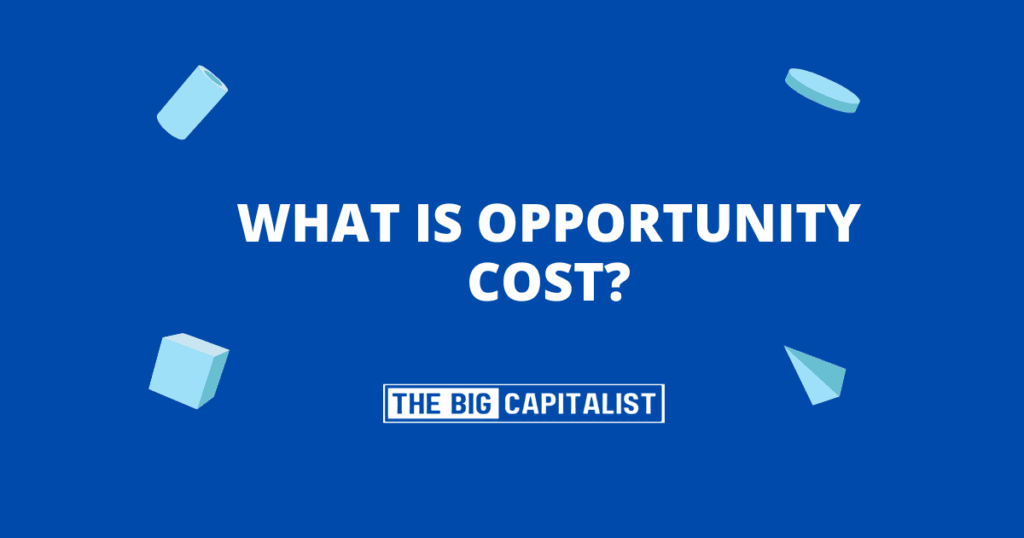In finance, opportunity cost is the value of what you don’t choose. It happens when you pick one investment or action over another, often leading to an opportunity cost in finance decisions.
When you spend your money or time on one thing, you miss the chance to use those resources for something else. This missed chance is called your opportunity cost in the context of financial choices.
1. A Simple Example
Imagine you have $1,000 to invest. You could:
- Invest in Stock A, which you believe might grow by 5% in a year.
- Invest in Stock B, which you expect might grow by 8% in a year.
If you pick Stock A, you’re giving up the potential higher return from Stock B—which is your opportunity cost. If you pick Stock B, your opportunity cost is missing out on Stock A’s 5% growth (though that might be less of a loss), illustrating the concept of opportunity cost in finance.
2. Why Is Opportunity Cost Important in Finance?
- Helps You Compare Returns
In investing, always ask, “Could my money earn more somewhere else?” This question helps you think about opportunity cost. Opportunity cost lets you compare the potential gains of one option to another, making it a critical component of understanding opportunity cost in finance. - Resource Allocation
In business, managers use opportunity cost to decide where to spend money or allocate resources. For example, buying new equipment might increase productivity by 10%. However, investing in a marketing campaign could raise sales by 15%. Choosing one over the other has an opportunity cost of losing the benefits of the other option. - Risk Management
By thinking about opportunity cost, you’re forced to consider different levels of risk and reward. Even if one option gives a higher return, it may also have bigger risks. You need to decide if it’s worth the trade-off in your financial decision-making process.
3. Opportunity Cost vs. Actual Cost
- Actual (Explicit) Cost: The direct money you pay, such as the price of a stock or the fee for a course.
- Opportunity (Implicit) Cost: The “hidden” cost of missing out on what you could have gained from another choice, which plays a crucial role in financial strategy and opportunity cost considerations.
For example, if you invest $1,000 in Stock A, the actual cost is the $1,000 you spend. The opportunity cost is the profit you might have earned if you’d put that $1,000 elsewhere—like Stock B or a savings account. This highlights an important aspect of opportunity cost in finance.
4. Tips to Factor in Opportunity Cost
- Compare Investment Options
Whenever you consider an investment, look at alternative options. Ask yourself: “Is there a better place for my money right now?” - Consider Your Time Frame
Some investments might yield slower but more stable returns over the long term, while others could grow faster but carry more risk. Your opportunity cost includes the potential gain you forgo by not choosing a different timeline or strategy in your financial plan. - Balance Risk and Reward
High returns often come with higher risk. Sometimes a safer investment with lower returns may be better for you. Just remember, the opportunity cost is the difference in gains you could have made with a riskier option, a key concept in understanding opportunity cost in finance. - Keep an Eye on Goals
If your goal is short-term security, like an emergency fund, you might skip riskier, higher-return investments. The opportunity cost is the extra profit, but the peace of mind might be worth it, especially when considering opportunity cost in finance goals.
Conclusion
In finance, opportunity cost is all about trade-offs. By understanding this concept, you become more aware of what you could be missing out on whenever you invest—or spend—your money, thereby fully grasping the concept of opportunity cost in finance.
Frequently Asked Questions (FAQ)
1. What is opportunity cost in finance, and why does it matter?
Opportunity cost in finance refers to the potential benefits you give up when choosing one option over another. It matters because every financial decision involves a trade-off—understanding what you’re sacrificing helps you make more informed and strategic choices, whether you’re investing, saving, or spending.
2. How do I apply opportunity cost to investment decisions?
To apply this concept, compare the potential returns of different options. For example, if you invest in one stock, consider what you might miss out on by not choosing another. Also factor in risk, time horizon, and your personal goals to ensure the decision aligns with your overall financial strategy.
Let me know if you’d like these reformatted for a blog, presentation, or social media snippet!
















